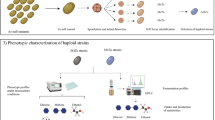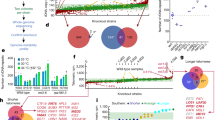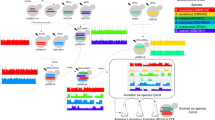Abstract
AN unusual type of spontaneous mutation has been detected in some diploid strains of Saccharomyces cerevisiae. Iodine staining of yeast colonies has revealed the presence of a high proportion of glycogen deficient mutants. In yeasts, glycogen is a reserve material, and the impaired storage ability, together with the high frequency of occurrence, made these mutants especially interesting. The iodine staining test has also shown that respiration deficient mutants growing on nutrient agar are deficient in glycogen when compared with the wild type yeast. The two types of mutation can be easily distinguished.
This is a preview of subscription content, access via your institution
Access options
Subscribe to this journal
Receive 51 print issues and online access
$199.00 per year
only $3.90 per issue
Buy this article
- Purchase on Springer Link
- Instant access to full article PDF
Prices may be subject to local taxes which are calculated during checkout
Similar content being viewed by others
References
Wickerham, L. J., Tech. Bull. No. 1029, U. S. Dept. Agric. (1951).
Trevelyan, W. E., and Harrison, J. S., Biochem. J., 63, 23 (1956).
Ephrussi, B., and Hottinguer, H., Cold Spr. Harb. Symp. Quant. Biol., 16, 75 (1951).
Ogur, M., St. John, R., and Nagai, S., Science, 125, 928 (1957).
Author information
Authors and Affiliations
Rights and permissions
About this article
Cite this article
CHESTER, V. Spontaneous Mutants of Yeast Deficient in Glycogen. Nature 214, 1237–1238 (1967). https://doi.org/10.1038/2141237a0
Received:
Issue Date:
DOI: https://doi.org/10.1038/2141237a0
This article is cited by
-
Trehalose: Its role in germination of Saccharomyces cerevisiae
Current Genetics (1983)
-
Genetic studies with a phosphoglucose isomerase mutant of Saccharomyces cerevisiae
Molecular and General Genetics MGG (1977)
Comments
By submitting a comment you agree to abide by our Terms and Community Guidelines. If you find something abusive or that does not comply with our terms or guidelines please flag it as inappropriate.



